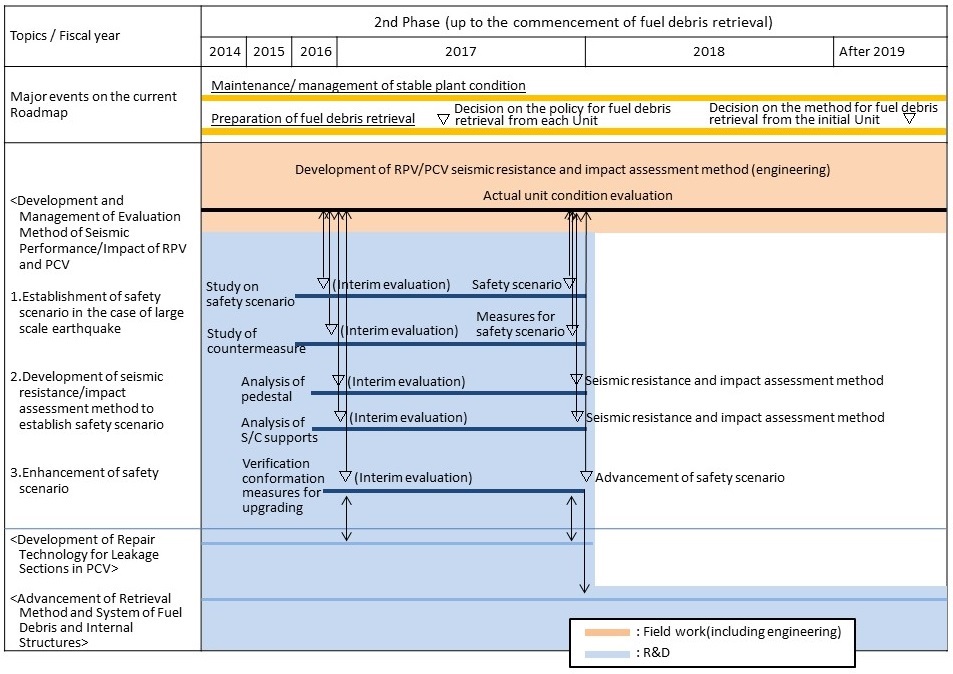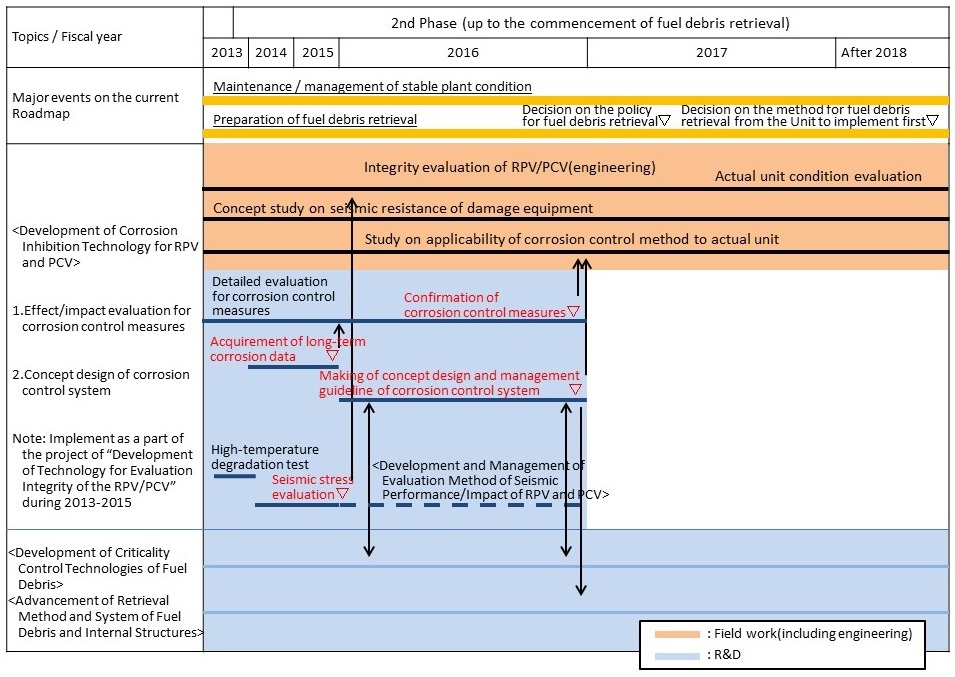Ensuring safety for fuel debris retrieval (1) (Structural integrity)
R&D efforts (Application development linked to plant applications and actual use)
Completed projects
Development and Management of Evaluation Method of Seismic Performance/Impact of RPV and PCV (Project of Decommissioning and Contaminated Water Management)
Summary
We performed impact assessment on large equipment in the event of a major earthquake, in consideration of the current situation, and retrieval situation (including medium term situation) for fuel debris retrieval over the long term. We also performed proof stress and seismic load assessment, and earthquake response analysis for important equipment, paying attention to the pedestal and S/C supports, mainly to develop seismic resistance/impact assessment methods. In order to achieve further upgrade of the assessment method that we have developed, we verified confirmation methods of analysis and test houses based on actually possible seismic resistance and requirements.
Action items
- Establishment of safety scenario in the case of large scale earthquake
- Development of seismic resistance/impact assessment method to establish safety scenario
- Development of seismic resistance/impact assessment method for pedestal and pressure control room supports
- Proof stress and seismic load evaluation
- Earthquake response analysis
- Enhancement of safety scenario
Implementing organizations
Implemented by IRID.
Implementation plan

Source: Progress status of R&D projects and direction for next period
(METI, Secretariat of the Team for Countermeasures for Decommissioning and Contaminated Water Treatment (February 23, 2017)) (PDF page 13)
Results & performance by fiscal year
- FY 2017
- FY 2016
- FY 2016 result report (Development and management of evaluation method of seismic performance/Impact of RPV and PCV (July 2017)) (IRID) (PDF)
- Progress status as of the end of February 2017 (METI, Secretariat of the Team for Countermeasures for Decommissioning and Contaminated Water Treatment (February 23, 2017)) (PDF page 24)
- FY 2015
- Progress status as of the end of February 2016 (METI, Secretariat of the Team for Countermeasures for Decommissioning and Contaminated Water Treatment (February 25, 2016)) (PDF page 41)
- Development of RPV/PCV integrity assessment technology purpose and project results (November 2015) (IRID) (PDF)
- FY 2014
- FY 2013
- FY 2012
Results & performance for individual projects, etc. (Archives)
Switch button
- Improvement of long-term forecasting of amount of rust
- Development of RPV/PCV integrity assessment technology
Development of Corrosion Inhibition Technology for RPV and PCV (Project of Decommissioning and Contaminated Water Management)
Summary
We performed electrochemical measurements of component materials in a solution to which we had added the corrosion inhibitors that were selected based on the results of corrosion tests. We performed un-irradiated corrosion tests and corrosion tests under gamma irradiation, assessed them for the possible generation or progression of local corrosion, and selected corrosion inhibitors that had applicability to actual equipment. Also, based on overall impact assessment of existing water treatment equipment systems that used corrosion inhibitors, and impact assessment on adsorptivity related to the concentration of corrosion inhibitors, we created an overall plan and control requirements for a corrosion countermeasures system.
Action items
- Effect/impact assessment for corrosion control measures
- Conceptual design of corrosion control system
Implementing organizations
Implemented by IRID.
Implementation plan

Source: Progress status of R&D projects and direction for next period
(METI, Secretariat of the Team for Countermeasures for Decommissioning and Contaminated Water Treatment (February 25, 2016)) (PDF page 18)
Results & performance by fiscal year
- FY 2016
- Result report (Development of corrosion inhibition technology for RPV and PCV (July 2017)) (IRID) (PDF)
- Progress status as of the end of February 2017 (METI, Secretariat of the Team for Countermeasures for Decommissioning and Contaminated Water Treatment (February 23, 2017)) (PDF page 26)
R&D efforts (related basic and generic research)
Steel structure corrosion, corrosion prevention (Decommissioning Basic Research: Human resource development program at Tohoku University - Basic research into reliability maintenance of PCV and buildings, etc., and waste processing and disposal, and core human resource development program for decommissioning)
Concrete structure assessment (Decommissioning Basic Research: Human resource development program at Tohoku University - Basic research into reliability maintenance of PCV and buildings, etc., and waste processing and disposal, and core human resource development program for decommissioning)
Plant investigation, measurement data, and information
Efforts to understand the plant status at each of Units 1 to 3, and for fuel debris retrieval (Updated December 4, 2025)
(METI, Secretariat of the Team for Countermeasures for Decommissioning and Contaminated Water Treatment)
- Current Status of Fukushima Daiichi NPS (As of October 30, 2025)
Plant-related parameters
- Plant-related parameters (Summary table) (PDF)
- Temperature parameters (Chart) Real-time data
- Unit 1 Temperature in the RPV (PDF)
- Unit 1 Temperature in the PCV (PDF)
- Unit 2 Temperature in the RPV (PDF)
- Unit 2 Temperature in the PCV (PDF)
- Unit 3 Temperature in the RPV (PDF)
- Unit 3 Temperature in the PCV (PDF)
- Fukushima Daiichi NPS plant data collected at the time of the accident (TEPCO)
- The Great East Japan Earthquake and Current Status of Nuclear Power Station(TEPCO)
- Outline of the plant (IRID) (PDF) only Japanese page
Fukushima Daiichi NPS survey map
Common data presented by Benchmark Study of the Accident at the Fukushima Daiichi Nuclear Power Plant (BSAF) related to accident progression analysis according to OECD/NEA
Information Portal for the Fukushima Daiichi Accident Analysis and Decommissioning Activities
Collection of figures of data on in-core situation (Updated regularly, August 2018)
Collection of links to data on in-core situation ( January 8, 2020)
- Grasping of fuel debris Only Japanese(PDF)
- Stability of fuel debris Only Japanese(PDF)
- Operation safety Only Japanese(PDF)
- Retrieval of fuel debris and others Only Japanese(PDF)
Chronology (Events after the accident, in-core situation, etc.) (Updated regularly, September 2018)
- Chronology of Fukushima Daiichi NPS (Excel File)
Other related information
<Updated regularly>